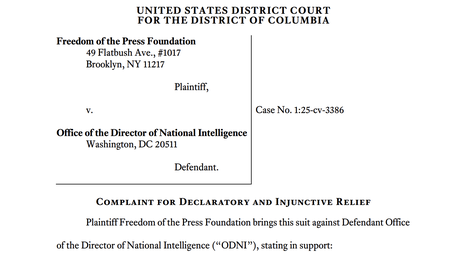Three new FPF FOIA suits target threats to transparency, press freedom


AP Illustration
The Freedom of Information Act gives the public a right to access government records.
The Freedom of Information Act is supposed to shed light on government activity by giving journalists and the public access to government records. But the law is in shambles. From endless delays in response time and unjustified refusals to ridiculously overbroad redactions, FOIA is plagued with problems.
We must fight back against the government’s refusal to comply with FOIA and urge Congress to reform the law and end backlogs of requests, reduce the number of exemptions, and overturn damaging court decisions.

Virtually every time the government has cracked down on leaks claiming some kind of threat to the homeland, the real threat has been to its own reputation.

Plus: No, the $400 million jet isn’t going to a library. It’s going to a private foundation.

And if the administration doesn’t want to disclose embarrassing information about its actions, it should stop making up reasons to deport people

Plus more of this week’s most important secrecy news.

The FOIA release also undercuts rationale for invoking the Alien Enemies Act to deport a group of Venezuelans to El Salvador.

Plus: White House move threatens world’s largest transparency project

New database will mark Trump’s 100th day in office

Plus: RFK Jr. says “We’re going to try to get as close as we can to total transparency.”

Freedom of Information Act lawsuit challenges legislative agency’s status

Plus: Excessive government secrecy might be bad for your investment portfolio
Something went wrong and your email updates subscription could not be processed. Please visit our signup page and try again.
Thanks for helping us protect FOIA and the right of the press and public to know what the government is up to.
Share this message on social media: